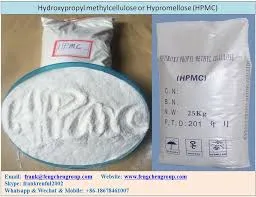
Dec . 06, 2024 02:47 Back to list
hydroxypropyl methyl cellulose cas number
Understanding Hydroxypropyl Methylcellulose A Comprehensive Overview
Hydroxypropyl methylcellulose (HPMC) is a versatile and widely used polymer in various industries, particularly in pharmaceuticals, food, and construction. It is a modified cellulose derivative that serves multiple functions, including as a thickening agent, emulsifier, and film-forming agent. This article explores the properties, applications, and significance of HPMC, along with its chemical identity, which is associated with its CAS number, 9004-65-3.
Chemical Structure and Properties
HPMC is derived from cellulose, a natural polymer found in plant cell walls. The modification process involves the introduction of hydroxypropyl and methyl groups into the cellulose chain. This alteration enhances its solubility and functionality in aqueous solutions. The degree of substitution (DS) of hydroxypropyl and methyl groups varies, leading to a range of HPMC products with different properties. The higher the DS, the greater the solubility in water.
One of the notable characteristics of HPMC is its ability to form gels and thicken solutions, making it an invaluable ingredient in many formulations. HPMC is non-ionic, making it less sensitive to changes in pH and electrolytes compared to ionic thickening agents. This stability is crucial in applications where pH variations or the presence of salts may occur.
Applications in Various Industries
1. Pharmaceuticals HPMC plays a significant role in the pharmaceutical industry, primarily in the formulation of drug delivery systems. Its properties allow it to be used as a binder, film-coating agent, and controlled-release matrix for oral dosage forms. HPMC can modify the release profile of active ingredients, providing sustained or delayed release, which enhances the therapeutic effectiveness of medications.
2. Food Industry In the food sector, HPMC is utilized as a thickening agent, emulsifier, and stabilizer. It helps improve the texture and mouthfeel of food products, making it popular in bakery items, sauces, and dressings. HPMC is also used in gluten-free formulations to mimic the elasticity and chewiness that gluten typically provides.
hydroxypropyl methyl cellulose cas number

3. Construction HPMC is increasingly used in construction materials such as adhesives, mortars, and plasters. Its water-retention properties enhance workability and adhesion, preventing cracking and improving overall durability. It also acts as a precursor for creating lightweight and insulating materials.
4. Cosmetics and Personal Care In personal care products, HPMC functions as a thickener and stabilizer in lotions, creams, and gels. Its ability to create a smooth texture and retain moisture makes it a preferred ingredient in many skincare formulations.
Safety and Regulatory Status
HPMC is generally recognized as safe (GRAS) by the Food and Drug Administration (FDA) and complies with various international regulations for food additives and pharmaceuticals. Its low toxicity and biocompatibility enhance its appeal across various applications. However, as with any substance, it is essential to adhere to recommended usage levels to ensure safety.
Conclusion
Hydroxypropyl methylcellulose is a multifaceted polymer that has carved a niche in numerous industries due to its favorable properties and functionalities. Its applications in pharmaceuticals, food, construction, and cosmetics highlight its versatility and importance in modern formulations. With its CAS number 9004-65-3, HPMC continues to be an essential ingredient that enhances product performance while ensuring safety and stability.
As industries evolve and new challenges arise, the demand for effective and multifunctional materials like HPMC is expected to grow. Ongoing research and development efforts will likely lead to innovative uses and formulations, reinforcing the significance of this remarkable compound in our everyday lives.
-
Versatile Hpmc Uses in Different Industries
NewsJun.19,2025
-
Redispersible Powder's Role in Enhancing Durability of Construction Products
NewsJun.19,2025
-
Hydroxyethyl Cellulose Applications Driving Green Industrial Processes
NewsJun.19,2025
-
Exploring Different Redispersible Polymer Powder
NewsJun.19,2025
-
Choosing the Right Mortar Bonding Agent
NewsJun.19,2025
-
Applications and Significance of China Hpmc in Modern Industries
NewsJun.19,2025







